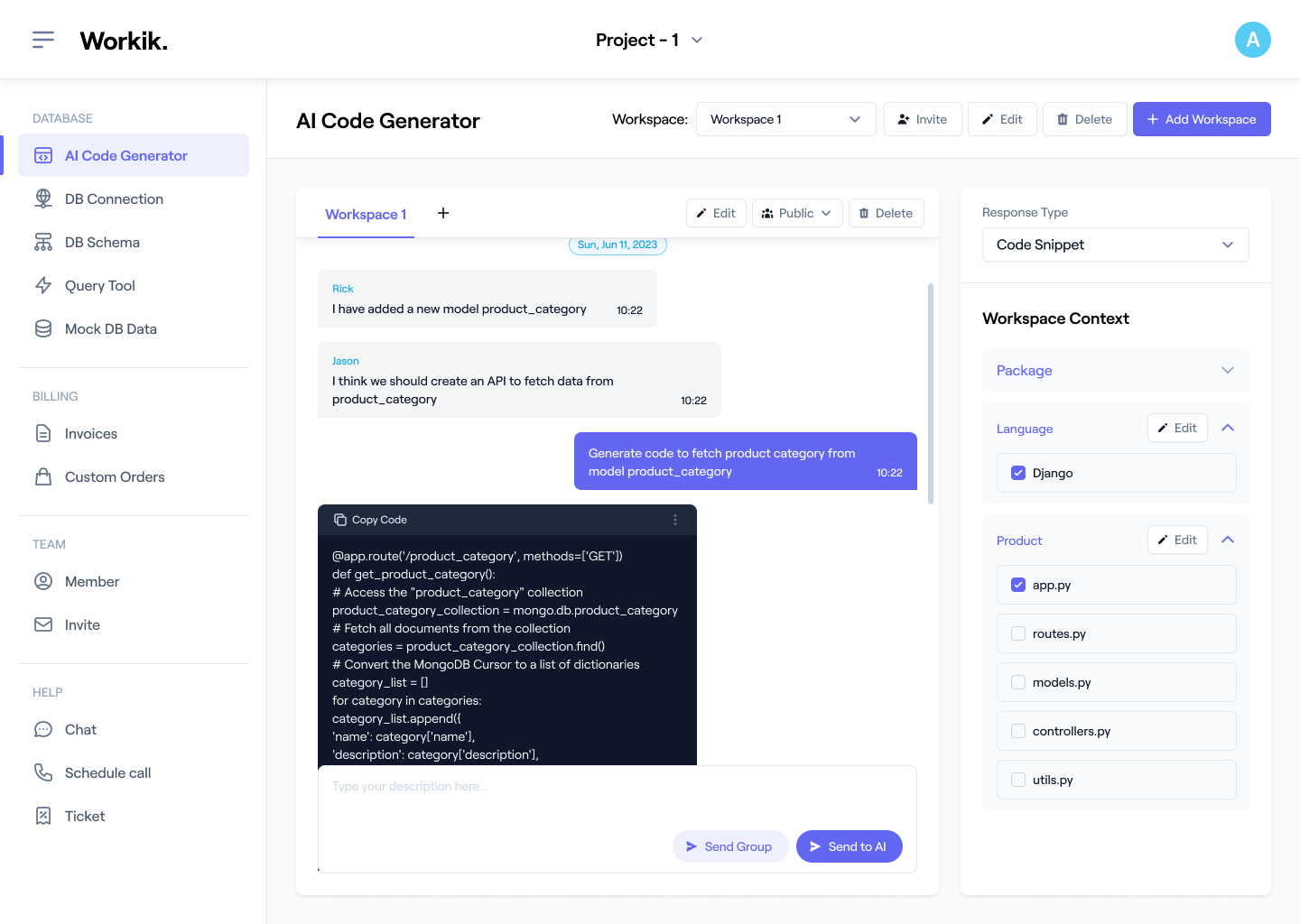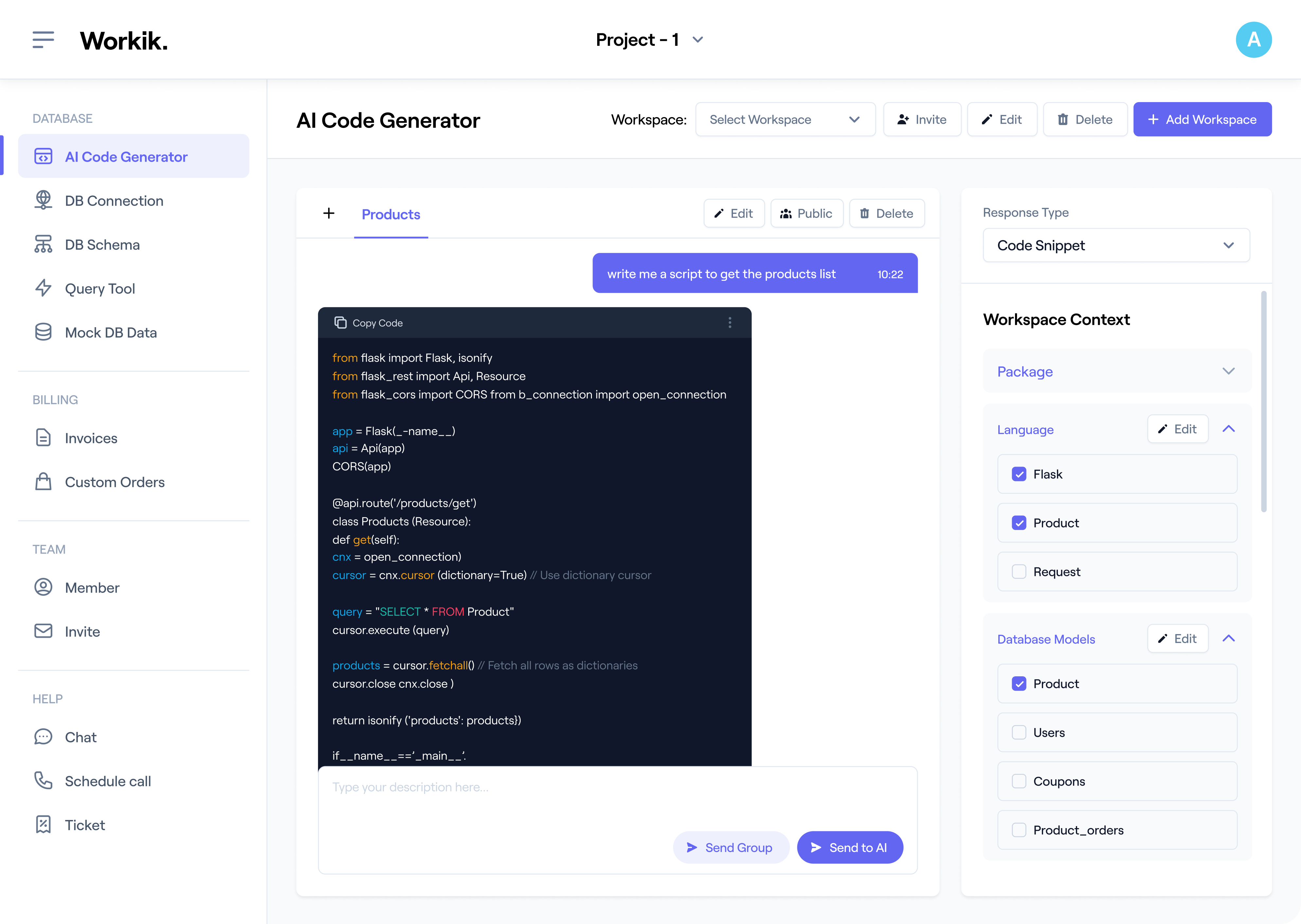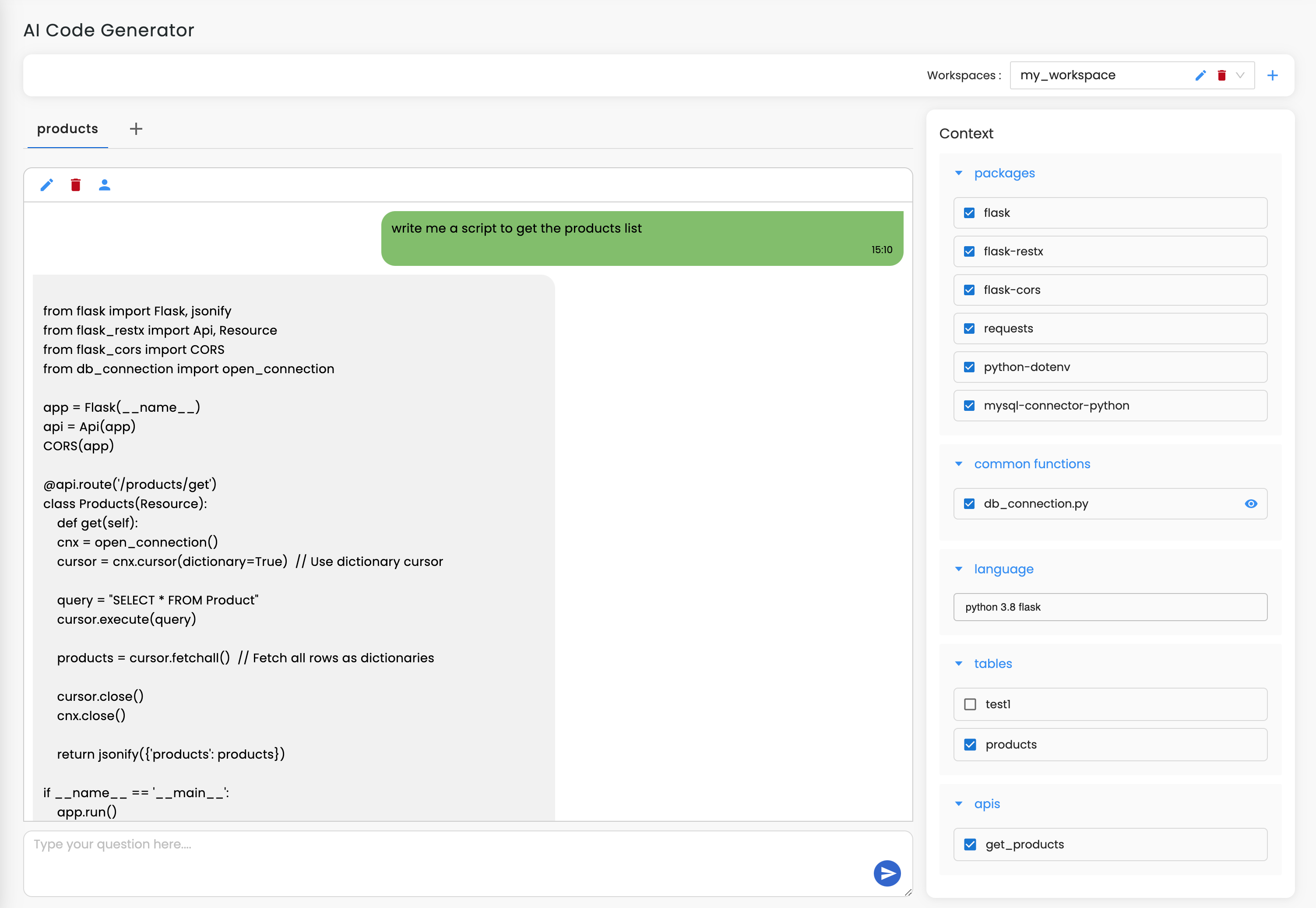
Join our community to see how developers are using Workik AI everyday.
Features

Instant Template Structuring
AI configures templates based on site taxonomy, SEO, and accessibility to set up a ready-to-use CMS structure.

Generate Backend Integrations
Leverage AI to link templates to data sources with REST or GraphQL. Helps set-up efficient database mappings and data flows.

Customize UI Components
AI integrates Bootstrap or Material UI, optimizing for responsive, branded, cross-browser design.

Enhance Performance Optimization
AI suggests lazy loading, minification, and caching, with integration to tools like Lighthouse.
How it works
Sign up on Workik with Google or manually in seconds, and dive into your CMS template project setup.
Connect repositories from GitHub, GitLab, or Bitbucket. Define CMS frameworks, content types, and SEO requirements for AI-tailored template generation.
AI can help you generate responsive, SEO-friendly templates, automate layouts, test, debug, document & more for easy CMS integration.
Share AI-generated templates with your team for feedback. Refine layouts, optimize for user experience, and boost CMS deployment.


Expand
.png)
.png)
Expand


Expand


Expand


Expand


Expand


Expand


TESTIMONIALS
Real Stories, Real Results with Workik
Workik AI transformed our CMS template creation. I can spin up dynamic, SEO-optimized layouts in minutes.

Anita Rodriguez
Senior Frontend Developer
Workik AI made CMS design so much easier! I go from idea to template without worrying about compatibility or performance.

Leo Chen
Junior Web Developer
Our team loves Workik AI for CMS templates! We saved hours on customization and design consistency.

Priya Mehta
Product Manager
What are the popular use cases of Workik's AI for CMS template generation?


Some popular use cases of Workik's AI-powered CMS template generation include but are not limited to:
* Generate custom page templates, from landing pages to blog layouts.
* Build reusable components, such as navigation bars, content blocks, and footers.
* Integrate external APIs and data feeds, like Google Analytics or CRM data.
* Optimize SEO elements, loading times, and mobile responsiveness.
* Configure templates for e-commerce features, including product grids, search filters, and checkout flows.
* Generate customizable forms and lead capture sections for user engagement.
* Create personalized, multi-language support templates for global audiences.
What kind of context can I add in Workik AI related to CMS template generation?


Setting context in Workik is optional but helps personalize the AI responses for your CMS projects. Here are the types of context you can add:
* Add your preferred CMS platform (e.g., WordPress, Drupal).
* Integrate codebase files from GitHub, GitLab, or Bitbucket.
* Mention libraries or frameworks (e.g., Bootstrap, Tailwind CSS).
* Add SEO requirements or accessibility guidelines.
* Integrate API blueprints using Swagger or Postman for custom CMS integrations.
Can Workik AI handle custom eCommerce CMS templates?


Yes, Workik AI generates templates for product grids, cart flows, and user accounts. AI can automate layouts optimized for product filtering and SEO. For example, in WooCommerce, AI can streamline checkout UX and generate templates fit for high-conversion design.
How does Workik AI improve CMS template performance for mobile users?


Workik AI creates mobile-optimized templates with responsive layouts, lazy loading, and optimized media. For instance, AI adjusts menus, image sizes, and touch interactions, producing a mobile-first design that enhances user experience, which is critical for CMS sites with high mobile traffic.
Can Workik AI help with accessibility in CMS templates?


Yes, AI builds accessible CMS templates by setting up screen reader compatibility, logical navigation, and color contrast. For a government CMS, AI can structure accessible forms and content, ensuring elements meet WCAG standards and enhance usability for all, including those with disabilities.
How does Workik AI streamline CMS integration with CRMs or analytics?


Workik AI enables integrations by generating code for data syncing, real-time tracking, and automated contact updates. For example, on HubSpot CMS, AI can set up workflows to sync contacts with external CRMs, enhancing data-driven strategies.
Can Workik AI create localized or multilingual CMS templates?


Yes, AI supports multilingual CMS templates by structuring code for translations, localized URLs, and language-specific layouts. On Joomla, AI can generate templates in English, Spanish, and French with automatic language detection for seamless localization.
Generate Code For Free

CMS: Question and Answer
CMS Template Generation is the process of creating reusable, adaptable layouts for content management systems (CMS) like WordPress, Drupal, and Joomla. With tools like Workik AI, developers can quickly build responsive, SEO-friendly templates that support diverse content types, are optimized for performance, and can be easily customized and deployed across multiple CMS platforms.
Popular frameworks and libraries used in CMS template generation include:
UI Frameworks:
Bootstrap, Tailwind CSS, Material UI
JavaScript Libraries:
jQuery, React
CSS Preprocessors:
Sass, LESS
Testing Tools:
Mocha, Jest
Data Handling:
GraphQL, Axios
Performance Optimization:
Lighthouse, Webpack
Some popular use cases for CMS template generation include:
Content Sites:
Build SEO-optimized templates for blogs, news, and dynamic content.
E-commerce:
Create customizable product and checkout layouts with seamless integrations.
Corporate Sites:
Design professional, brand-aligned templates for company websites.
Landing Pages:
Generate high-conversion templates optimized for marketing.
Documentation Sites:
Structure templates for intuitive documentation or knowledge bases.
Professionals skilled in CMS template generation can pursue various roles, including Frontend Developer, CMS Developer, UI/UX Designer, Template Specialist, CMS Integration Engineer, SEO Engineer, and Web Performance Engineer.
Workik AI provides comprehensive support for CMS template development, including:
Dynamic Layouts:
Generates reusable, SEO-friendly layouts based on CMS content.
Responsive Design:
Builds cross-device compatible templates using frameworks.
API Integrations:
Easily connects templates to REST or GraphQL APIs.
Data Handling:
Automates real-time data syncing from external sources.
SEO Optimization:
Adds structured data, meta tags, and other SEO best practices.
Performance Tuning:
Applies lazy loading, code-splitting, and caching for faster load times.
Testing:
Sets up unit tests using tools like Jest or Mocha to verify template functionality.
Debugging:
Detects and fixes errors, ensuring reliable template performance.
Explore more on Workik
Get in touch
Don't miss any updates of our product.
© Workik Inc. 2026 All rights reserved.

